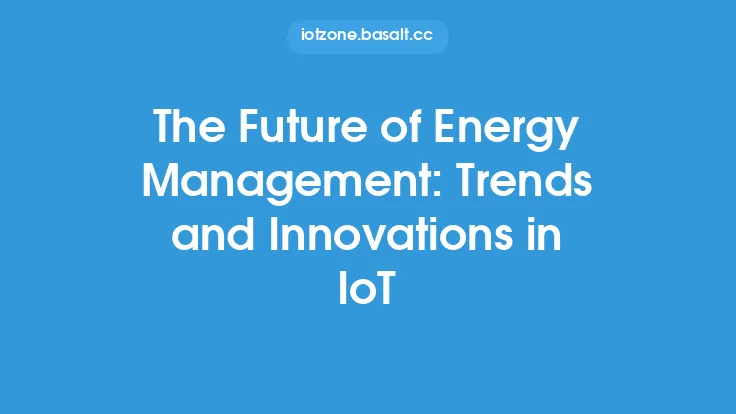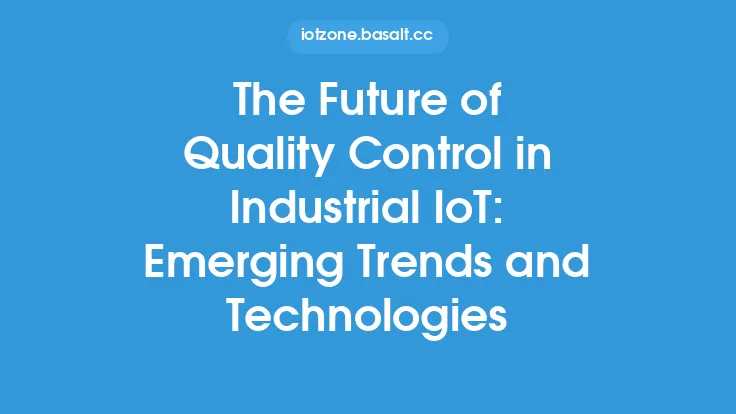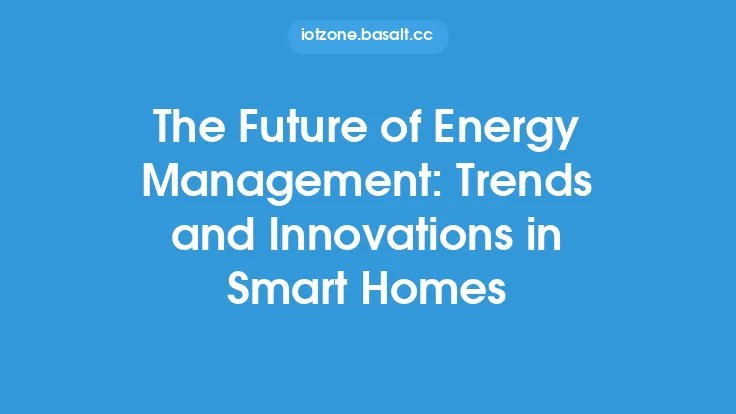The supply chain management landscape is undergoing a significant transformation, driven by the increasing adoption of Industrial Internet of Things (IIoT) technologies. As organizations strive to improve efficiency, reduce costs, and enhance customer satisfaction, the integration of IIoT solutions is becoming a key strategic imperative. In this article, we will delve into the trends and innovations that are shaping the future of supply chain management, and explore the role of IIoT in driving this transformation.
Introduction to Industrial IoT in Supply Chain Management
Industrial IoT refers to the use of IoT technologies in industrial settings, such as manufacturing, logistics, and supply chain management. The application of IIoT in supply chain management enables the real-time monitoring and control of assets, inventory, and shipments, allowing organizations to make data-driven decisions and optimize their operations. IIoT technologies, such as sensors, RFID tags, and GPS tracking devices, provide visibility into the supply chain, enabling organizations to track and trace shipments, monitor inventory levels, and detect potential disruptions.
Key Trends in Supply Chain Management
Several trends are driving the adoption of IIoT in supply chain management, including the increasing use of cloud-based platforms, the rise of edge computing, and the growing importance of cybersecurity. Cloud-based platforms provide a scalable and flexible infrastructure for managing supply chain data, while edge computing enables real-time processing and analysis of data at the edge of the network. Cybersecurity is also becoming a critical concern, as the increasing use of connected devices and sensors creates new vulnerabilities and risks.
Innovations in Supply Chain Management
Several innovations are transforming the supply chain management landscape, including the use of artificial intelligence (AI) and machine learning (ML) algorithms, the adoption of blockchain technology, and the development of autonomous vehicles and drones. AI and ML algorithms can be used to analyze supply chain data, predict demand, and optimize inventory levels. Blockchain technology provides a secure and transparent way to track and verify shipments, while autonomous vehicles and drones are being used to improve the efficiency and speed of logistics operations.
The Role of Data Analytics in Supply Chain Management
Data analytics plays a critical role in supply chain management, enabling organizations to gain insights into their operations and make data-driven decisions. The use of advanced analytics techniques, such as predictive analytics and prescriptive analytics, can help organizations to forecast demand, optimize inventory levels, and identify potential disruptions. The integration of data analytics with IIoT technologies, such as sensors and RFID tags, provides a powerful tool for optimizing supply chain operations and improving efficiency.
The Impact of 5G Networks on Supply Chain Management
The rollout of 5G networks is expected to have a significant impact on supply chain management, enabling the widespread adoption of IIoT technologies and providing a faster, more reliable, and more secure connection. 5G networks will enable the real-time transmission of data from sensors and other devices, allowing organizations to monitor and control their supply chain operations in real-time. The low latency and high bandwidth of 5G networks will also enable the use of applications such as augmented reality and virtual reality, which can be used to improve the efficiency and effectiveness of logistics operations.
The Future of Supply Chain Management
The future of supply chain management will be shaped by the increasing adoption of IIoT technologies, the growing importance of data analytics, and the need for greater visibility and transparency. As organizations strive to improve efficiency, reduce costs, and enhance customer satisfaction, the integration of IIoT solutions will become a key strategic imperative. The use of advanced analytics techniques, such as AI and ML, will enable organizations to gain insights into their operations and make data-driven decisions. The development of new technologies, such as autonomous vehicles and drones, will also play a critical role in shaping the future of supply chain management.
Challenges and Limitations
Despite the many benefits of IIoT in supply chain management, there are several challenges and limitations that must be addressed. These include the need for greater standardization, the importance of cybersecurity, and the requirement for significant investment in new technologies and infrastructure. The lack of standardization can make it difficult to integrate different IIoT systems and devices, while the increasing use of connected devices and sensors creates new vulnerabilities and risks. The significant investment required to implement IIoT solutions can also be a barrier to adoption, particularly for small and medium-sized enterprises.
Conclusion
In conclusion, the future of supply chain management will be shaped by the increasing adoption of IIoT technologies, the growing importance of data analytics, and the need for greater visibility and transparency. As organizations strive to improve efficiency, reduce costs, and enhance customer satisfaction, the integration of IIoT solutions will become a key strategic imperative. While there are several challenges and limitations that must be addressed, the benefits of IIoT in supply chain management are clear, and the technology is expected to play a critical role in shaping the future of the industry.




